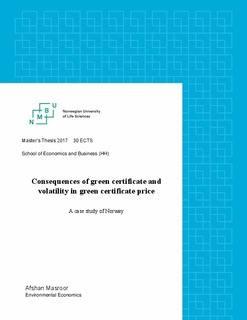| dc.contributor.advisor | Bye, Torstein | |
| dc.contributor.author | Masroor, Afshan | |
| dc.coverage.spatial | Norway | nb_NO |
| dc.date.accessioned | 2017-05-23T11:51:37Z | |
| dc.date.available | 2017-05-23T11:51:37Z | |
| dc.date.issued | 2017 | |
| dc.identifier.uri | http://hdl.handle.net/11250/2443307 | |
| dc.description.abstract | In last two decades national governments have increased their support to renewable energy sources (RES). The European Union (EU) has been considered as a pioneer in this area. The Norwegian governmental policies have also applied several support schemes to induce investment on environmental friendly technology. One of the main tools presented by the Norwegian government is the Norwegian-Swedish electricity certificate system.
The electricity certificate market is a market-based support scheme where the producers of renewable electricity receive one certificate per MWh of electricity they produce and the electricity consumers are obligated to support the system by purchasing certificates corresponding to a certain proportion (quota) of the electricity use.
The current study investigated the impacts of the electricity certificate quota on renewable production, wholesale electricity and certificate price and economic growth in Norway. Furthermore, the role of regulatory changes or economic uncertainty on the certificate price volatility was also investigated. The monthly data has been collected from the time period 2012 to 2016. Only Norwegian electricity certificate market has been considered.
The analysis criterion of the current study is that it should be understandable. The understandable means that the developed models should be clearly defined and easy to use. In order to meet this criterion, the models are limited to simple time series models such as regression and GARCH models. The regression model was used to analyze the relationship of different variables with the electricity certificate quota and the GARCH model was used to investigate the role of regulatory changes on price volatility in the Norwegian certificate market.
The findings agreed with previous research that as the electricity certificate quota increases, the supply of renewable electricity in the energy market increases, which tends to decreases the wholesale electricity price. Furthermore, increased certificate quota accelerates the investment in renewable electricity which contributes to the economic growth. On the other hand, the current findings did not verify the increased certificate price with raised certificate quota. Moreover, the regulatory changes or economic uncertainty have effects on the certificate market, resulting in period of higher volatility. | nb_NO |
| dc.language.iso | eng | nb_NO |
| dc.publisher | Norwegian University of Life Sciences, Ås | nb_NO |
| dc.rights | Attribution-NonCommercial-NoDerivatives 4.0 Internasjonal | * |
| dc.rights.uri | http://creativecommons.org/licenses/by-nc-nd/4.0/deed.no | * |
| dc.title | Consequences of green certificate and volatility in green certificate price : a case study of Norway | nb_NO |
| dc.type | Master thesis | nb_NO |
| dc.subject.nsi | VDP::Samfunnsvitenskap: 200 | nb_NO |
| dc.description.localcode | M-ECON | nb_NO |

